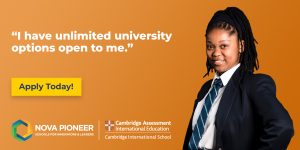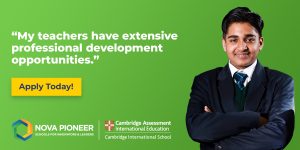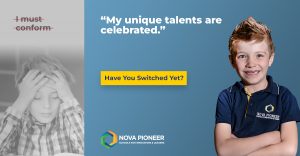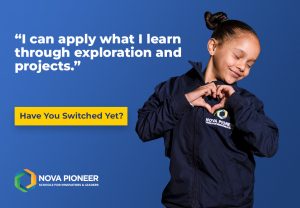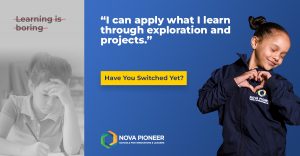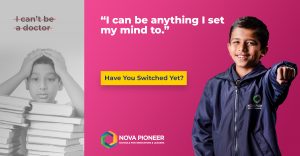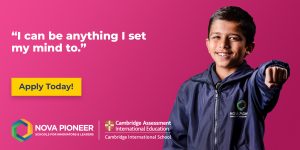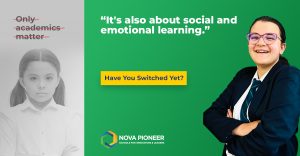In our fast and ever-changing world, it is important that children learn a few key skills from a young age, most of which should be taught at school level. A student’s ability to become successful in the real-world (and face the daily challenges presented in the workplace) weighs heavily on
In our fast and ever-changing world, it is important that children learn a few key skills from a young age, most of which should be taught at school level. A student’s ability to become successful in the real-world (and face the daily challenges presented in the workplace) weighs heavily on their ability to problem-solve and to think “outside the box”.
It is to be expected that there will be myths and misconceptions surrounding the Cambridge curriculum, given it’s not widely taught in the majority of South African schools. The majority of the myths and misconceptions are baseless.
Formed by the UK’s University of Cambridge more than 150 years ago, Cambridge Assessment International Education (CAIE) is the world’s largest provider of international education programmes to over 8 million candidates in 160 countries.
Nova Pioneer school network holds itself to very high standards, and it has been our objective since conception to lead, innovate, and always grow. The Cambridge curriculum has been specifically selected to set up Nova Pioneer students for success. We have highlighted five common misconceptions and hope to provide some clarity.
MYTH: Cambridge curriculum qualifications are not recognised by SA universities
Fact: The Universities of South Africa (USAf) matriculation board has standardised its acceptance of international qualifications including those issued by Cambridge Assessment International Education (CAIE). All South African universities have established their minimum entry requirements for students holding a CAIE qualification and fully accept them. Students from Cambridge who pass the AS or A level exams with a bachelor’s degree can apply to USAf for a matric equivalence, and students who pass the AS level exams with the equivalent of an NSC or diploma can do the same with South African Qualifications Authority (SAQA). Both processes are simple and instant. Many of our Nova Pioneer alumni are already enrolled in South Africa universities and are thriving, this alone dispels this erroneous misconception.(Cambridge A Level qualifications are also recognised and valued by all Ivy League and Ivy Plus universities in the US, all UK universities, as well as those in Australia, Canada, Germany and beyond.)
MYTH: The Cambridge curriculum is overly difficult
Fact: Nova Pioneer was founded with the mission to offer high-quality education, at accessible fees and the Cambridge curriculum is not only rigorous but internationally-recognised, giving our students an advantage over most. Through our teaching and learning methods all students accepted in our schools have the opportunity to thrive with the Cambridge curriculum. The end point of (AS and A level) is explicitly to prepare our students for tertiary education, they are required to engage in depth with the skills and content of each subject they choose. We impart and cultivate a mindset and attitude that allows the student to engage course material independently, inside and outside the classroom. The Cambridge curriculum emphasises understanding and application of knowledge rather than rote memorisation of facts in order to pass exams. Although rigorous and demanding, Cambridge is NOT overly difficult.
MYTH: It will be easier for my child to get higher symbols with the national CAPS curriculum
Fact: This is yet another misconception directly linked to the notion that Cambridge is overly difficult. Let us establish the fundamental purposes of both CAPS (Curriculum and Assessment Policy Statement) and Cambridge: CAPS provides a general school exit requirement which allows a student to go to university, vocational training or join the workforce – this curriculum is more prone to provide the minimum, in this respect. Students are tested on their ability to retain and recapitulate information and students which may not adequately prepare them for tertiary education or life beyond school. In 2019 only 22% of CAPS students were able to complete degrees in the allotted time. However, Cambridge AS and A Levels are specifically designed to prepare students for the rigours of a university education. Fewer subjects are studied at A-Level, which means a more concentrated approach. Deep knowledge of focused subjects as well as conceptual understanding is fostered, encouraging students to develop higher-order problem solving and thinking skills. Much of the content covered is at first year university level, and consistent feedback from our alumni is that they are certainly at an advantage to their CAPS counterparts because they have covered most of the content and can cope with the academic demands of tertiary schooling.
MYTH: There are not enough Cambridge-qualified teachers in South Africa and therefore the curriculum will not be delivered to the benefit of my child
Fact: There is no teacher qualified to teach the Cambridge curriculum but a teacher with experience teaching the Cambridge curriculum. At Nova Pioneer we require our teachers to be fully qualified (with a Bachelors of Education) and SACE (South African Council for Educators) registered, our apprentices should be currently studying towards their degree or PGCE (Post Graduate Certificate in Education). The rigorous and demanding nature of Cambridge requires our teachers to be experts in the subjects that they teach. More often than not, our teachers in AS and A level will have a postgraduate qualification in the subject that they teach. In order for our teachers to teach the curriculum to its fullest potential we offer extra support through Cambridge run courses that assist in innovation and thorough methods of teaching and assessing in the Cambridge system. Teacher retention is a priority, as this helps us retain and grow the “Cambridge Knowledge” that we have accumulated over the years. The curriculum is student-centred and enquiry-based and our teachers fully practise these fundamentals – with the help of our Deans of Instruction we authentically embed this approach within our teacher cohort through regular professional development opportunities. Cambridge representatives offer us regular assessments to ensure we are delivering the curriculum and assessments to required standards.
MYTH: Cambridge schools in South Africa lack support in delivering the curriculum
Fact: Nova Pioneer is a fully accredited Cambridge school and has immediate and full access to a range of support services from Cambridge: these include but are not limited to teaching resources, assessment and staff training facilities. The exam officers in each campus have a direct line to Cambridge in the United Kingdom; and our active partnership with the Cambridge office in South Africa ensures we receive support with training, queries around USAf criteria, conference and meeting attendance. We have created small support communities with other Cambridge schools in the Gauteng area. Nova Pioneer has high schools in Ormonde, Midrand and Ruimsig.
We constantly urge parents to think carefully about the curriculum and the school their children attend, which is why we are always prepared to have in-depth conversations with prospective and current parents and students.
For more information, reach out to our admissions team at admissions.sa@novapioneer.com.
